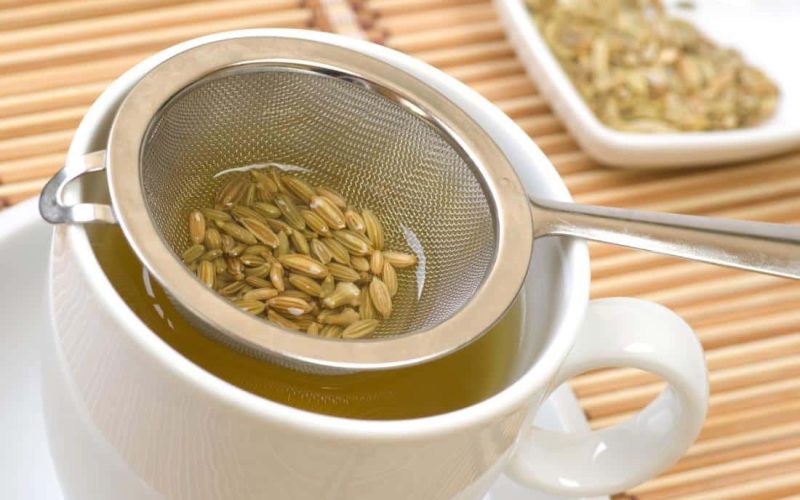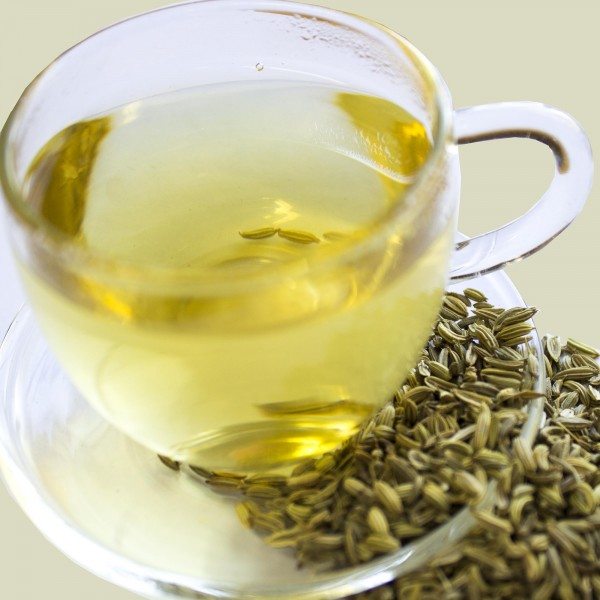Although a lot of people lack knowledge about this tea, fennel tea is famous for its numerous health benefits.
Whether or not you’ve seen it in the supermarket or somewhere around your kitchen, the fact remains that this ignored and forgotten fennel continues to be one widely used plant.
The seeds are usually brownish-green in color when fresh, and then turns dull grey when it ages. This plant is known for its numerous health benefits right from the days of old.
Now is time to get people more enlightened about this great wonder.
What Is Fennel Tea?
Fennel is also known scientifically as Foeniculum Vulgare. It is a herbal plant used both for therapeutic and culinary purposes.
Peculiar to the Mediterranean, it is now available in every part of the world. Its seed has this anise-like flavor. Both the seeds and oil are used in making medicine.
Before now, China, the Middle East, and India used it as traditional medicine. Today, it’s usefulness has spread around the globe.
It has also been used in various cuisines ranging from Italian to Indian to contemporary fusion, and one good thing is that every part of the plant is used from the leaves, seeds, down to the bulb.
Regarding history, the use of fennel dates back to Ancient Greece and Rome, where it was used in traditional celebrations and rituals as a symbol of nature.
It was, however, recommended by the Ancient Greek doctors that lactating mothers should take fennel tea for the promotion of breast milk supply.
Fennel tea is easy and straightforward to make. Simply boil your fennel seeds in water in a way that the volatile oil mix well with the water, and then your tea is as good as ready.
What Is Fennel Tea Good for?
There are a number of reasons to explain how beneficial this plant is to our health. It consists of different antioxidants and other compounds that are beneficial to health. Boosting the immune system and promoting heart health are some of its overwhelming benefits.
Interestingly, the health properties of fennel tea were so common that it was used as an antidote to snake and insect bites in India and China. Olympic athletes in Ancient Greece also used the fennel plant to boost stamina strength and increase longevity.
This wonder plant is also a rich source of amino acids and a number of vitamins, including A, B-complex, C, and D, and other numerous nutrients. It is, therefore, without a doubt, that it must be included in our diet.
Health Benefits of Fennel Tea
- Treats Gastrointestinal Problems and Improves Digestive health
Fennel is often seen as an antispasmodic; it is an herb that contains digestion-enhancing properties. Its seeds are well known to stimulate bile, which reduces pain and enhances digestion.
Traditional Persian scholars have it in agreement that it’s aromatic properties help relieve flatulence, expels gas from the body, and improves the overall digestive process by supporting blood circulation to the gastrointestinal tract.
A number of studies have proven that fennel promotes the health of the gastrointestinal tract. Also, a rich source of fiber, fennel, clears the colon and large intestine, keeping them healthy. Its spicy nature makes it able to relieve gut-based gas production.
Although there isn’t enough backing evidence, there’s an accounted proof to support that fennel tea can relieve diarrhea, stomach cramps, flatulence, and bloating, all of which are symptoms of irritable bowel syndrome.
- Burns Body Fat
It might sound surprising how fennel burns fat, but the truth is it does. It comes down to fennel’s ability to aid digestion. Your body tends to incorporate nutrients better when digestion is improved. It, therefore, keeps your body satiated and reduces craving, which helps in weight loss.
Furthermore, being a hot temperament herb helps reduce the levels of serum glucose, water retention, and promotes weight control in humans
Fennel tea helps to boost metabolism, regulate your appetite, and kills cellulite making it one of the best weight loss tea for you.
- Treats Respiratory Problems
An Egyptian study shows that fennel has been used for centuries to treat a number of respiratory disorders. Due to the presence of antimicrobial properties in this plant, it can also be used for treating catarrh , an upper respiratory tract infection.
A study carried out by Ontario Veterinary College shows that a herbal composite that contains fennel was found to reduce the symptoms of respiratory dysfunction in horses; the same result was found to be possible in humans.
Also, fennel cleanses the bronchial passages, treats respiratory issues, and ease spasm in the respiratory system. It is suitable for the lungs. A Portuguese study suggests that fennel should be used for bronchitis and chronic cough treatment.
- Improves Heart Health
Fennel is a rich source of fiber. Fiber helps to stop the reabsorption of cholesterol and fights against heart diseases.
Fennel also contains antioxidants and vitamins that maintain a healthy heart. These antioxidants and vitamins help to lower cholesterol levels and prevent hypertension.
However, there is a connection between the heart and liver health, of which not everyone is conscious of. Cholesterol is produced and broken down in the liver. The breakdown of cholesterol is regulated and made efficient by a healthy liver. Fennel, therefore, strengthens the heart and supports the proper functioning of the liver.
Also, a rich source of potassium, fennel, helps keep blood pressure in check, counter unwanted sodium effects, prevents hypertension and heart diseases.
- Boosts the Immune System
Having a strong immune system to help fight against bacteria and viruses is considered being healthy.
Fennel is high in vitamin C, an antioxidant that fortifies the immune system. It also contains selenium that helps perk up the production of T-cells (these cells participate actively in the immune response).
Conclusively, fennel help treats most upper respiratory tract illnesses such as cough, bronchitis, and asthma by removing excess phlegm. It also has antimicrobial properties that enhance immunity.
- Enhance Healthy Eyesight
A study conducted in Iran shows that fennel extract improves vision. Vitamin C, as one of the nutrients of fennel, plays a significant role in keeping the eye safe and healthy. Fennel seed is seen as a potential treatment for glaucoma. It’s tea also can be used as an eyedrop or applied as a compress.
A low level of vitamin C in the eye lens can increase the chances of developing cataracts . The antioxidant present in fennel protects the eye from conjunctivitis and any other eye infection or inflammation.
Fennel offers antioxidant protection due to its high vitamin C content. Do your eyes feel puffy? Dipping a ball of cotton wool into a small amount of fennel tea and placing it over your eyelids will do the trick.
- Balance the hormone level
An Italian study shows that fennel contains phytoestrogens, which promote hormonal balance. Another American study has it that fennel seeds are capable of treating polycystic ovary syndrome (PCOS), a hormonal disorder that’s common amongst women of reproductive age.
The phytoestrogen contained in fennel makes it useful for reducing symptoms of hormonal imbalance. Fennel also contains phytohormones , which regulates the hormones of the body and prevents any sort of imbalance.
Progesterone is another significant hormone when it comes to bringing to balance the thyroid and glandular system, and fennel is rich in progestogenic substances.
- Relieves Arthritis
The use of fennel tea to cleanse your body helps to enhance the overall health of your tissues and joints, thereby alleviating arthritic pain.
One study shows that some problems of inflammation responded well to fennel. This herbal plant also raises the activity of an antioxidant known as superoxide dismutase, which helps in the reduction of inflammation.
A Mumbai study has it that fennel is one herb that is widely used to treat arthritis-related symptoms. It also possesses osteoprotective properties.
- Enhance Healthy gums
Thanks to fennel’s antimicrobial and antibacterial properties, gargling fennel tea can help relieve inflamed gums and treats bad breath.
- Relieve Menstrual Problems
Menstrual pain, according to some studies, is caused probably by contraction of the uterine muscles, and fennel has been found to calm these muscles.
The ability to stimulate the production of estrogen, thereby alleviating menstrual cramps and post menstrual syndrome (PMS) is one great benefit of fennel tea.
Studies have it that fennel can be used to treat painful menstrual cramps and also help regulate the thyroid in order to have a healthy flow.
A 2002 Iranian study shows that high school girls who underwent menstrual pain reported improvement of their condition after taking fennel tea. Another study also stated that the use of fennel could relieve menstrual symptoms like nausea and general weakness.
- Fennel Tea For children
Fennel tea has been proven to be safe and suitable for children; it relaxes the gastrointestinal tract and helps reduce colic symptoms.
Fennel has a relaxing effect on the intestines of the baby. However, this herb is not suggested for infants below the age of 4 months.
An Italian study states that the infusion of fennel helps to stop flatulence and colic spasm in children. However, it has been found unsafe in some cases, therefore consult your pediatrician before using fennel tea for your infant.
- Terminates Internal Parasites
Fennel can be considered a natural dewormer; it is used to kill internal parasites . Fennel tea helps reduces acid levels and kills intestinal worms and bacteria.
Fennel tea contains laxative properties that enhance natural intestinal movement, thereby flushing the worms out of your system. Certain studies suppose that fennel stops worms from multiplying.
- Boosts libido
Fennel can be considered a natural libido booster; it enhances sexual desire in men. It also helps alleviate bladder and prostate-related issues as well as prolong orgasm.
- Treats acne
Fennel contains essential oils like limonene, anethole, and myrcene. They contain anti-inflammatory properties that treat skin conditions such as acne. It also helps flush out excess fluids from the skin that could lead or contribute to acne.
- Treats Diabetes
An Indian study states that fennel is one of the ten foods considered to have properties that relieve diabetic complications.
Another study shows that 250 milligrams of fennel had, to no small extent, lowered blood sugar levels in the rats that were tested upon, indicating similar possibilities in humans.
Since fennel is rich in vitamin C, a high intake of vitamin C may help reduce the blood sugar levels, especially in people who have Type 2 diabetes.
Fennel has a low glycemic index. This makes this herbal plant more favorable to blood sugar control and a portion of beneficial food in the diabetic diet. The fennel seeds contain certain chemicals that can act against diabetes.
Its high potassium content also makes fennel considered a diabetes superfood. Potassium is proven to increase insulin sensitivity and is therefore suggested for diabetes.
A study carried out on over 2,000 people by the University of Maryland Medical Centre found out that proper levels of magnesium in the diet can protect against Type 2 diabetes.
- Prevents Cancer
An American study showed that herbal supplement that has fennel as one of its ingredients might help fight against prostate cancer. Fennel tea contains different antioxidants that fight against cancer.
Also, fennel contains a significant amount of bioactive compounds, such as quercetin, which shows no cancer activity. Fennel is also known to be a potent anti-inflammatory plant due to the presence of a phytonutrient called anethole. This compound, apart from hindering inflammation, also restricts the transformation of regular cells into cancerous ones.
According to a report by Tennessee State University, fennel has been discovered to stop the growth of lung cancer cells. Fennel also curtails the activity of NF kappa B, a protein responsible for different inflammatory diseases, including cancer. Its high source of fiber and vitamin C makes fennel an essential food in cancer treatment.
Fennel is also considered to have remarkable anticancer ability against breast and liver cancer cells. The antioxidants present in fennel along with the fiber, help cleanse the colon and prevent colorectal cancer.
- Treats Heartburn
One of the applications of fennel is in the treatment of heartburn. Drinking a cup of fennel tea helps to ease the pain and burning of indigestion.
- Acts as a Blood Purifier
Fennel is a blood cleanser that improves kidney function and prevents kidney stones. It also protects the liver from alcohol damage, increases healthy urine flow, and treats diseases such as jaundice.
- Improves women health
The volatile oils in fennel possess mild estrogen-like qualities. Fennel is used in stimulating the production and flow of milk in lactating women; it is also used to treat amenorrhea in women. The presence of anethole in fennel oil is used by midwives as a tonic to protect the female reproductive system. Hence, it enhances the general health of women.
- Helps with morning sickness
Fennel tea goes a long way in helping expectant mothers, especially with morning sickness and sore nipples. Although it has not been ascertained, nursing mothers can consume fennel tea to increase the flow of milk and with the approval of their doctor.
However, they can only take 2 to 4 cups of fennel tea daily.
Fennel Tea Dosage
What is the ideal dosage of fennel tea? What amount of fennel can you take in a day? Well, using 5 to 7 grams of fennel seeds in tea per day is ideal. Also, a dosage of 500mg/kg is considered high and can lead to side effects such as loss of appetite and piloerection.
Fennel Tea Preparations and Recipes
Wondering how you can make fennel tea at home? Here are a few recipes and step by step preparation processes.
Ginger Fennel Tea
2 teaspoons Fennel seeds
1 teaspoon fresh grated Ginger
1 teaspoon dried lemon verbena
- Grind the fennel seeds to release their volatile oil
- Place all the ingredients into a saucepan, add some water, and bring to boil.
- Once it boils, allow simmering for 10minutes on low heat.
- Drain and serve.
Cumin Coriander Fennel Tea
2 teaspoons fennel seeds
1½ cups of water
2 teaspoons cumin seeds
2 teaspoons Coriander seeds
- Add the water into a saucepan and bring to boil.
- Add all of the other ingredients— the cumin, coriander, and fennel seeds
- Cover and allow to cook for 5 minutes
- Strain and serve.
Peppermint Fennel Tea
½ teaspoon fennel seed
2 teaspoons peppermint leaves
- Grind the seeds and add all the ingredients into a jar.
- Pour a cup of hot water into the jar
- Cover and allow it steep for 5 minutes
- Serve.
Where to Buy Fennel Tea
You can purchase packs of fennel tea bags online and in major shopping outlets.
Side Effects of Fennel Tea
No matter how amazing and beneficial any food is, it may have side effects, and fennel tea is no exception. We will, therefore, be taking a look at those side effects of fennel tea.
- May React with Drugs
If you are on any medications, you may want to talk to your doctor before using fennel. Fennel tends to interact with certain medicines like ciprofloxacin and fluoroquinolone and enhance their effects.
Therefore, to avoid any form of interaction, avoid the use of fennel when taking drugs. If you’re also prone to blood clots, then take this tea in moderation.
- Harmful to pregnant women
Certain studies have shown that the use of fennel can be harmful during pregnancy. It is advisable not to take fennel herbal tea during pregnancy as it may become toxic and harmful to the fetus.
Fennel may also cause miscarriage in pregnant women, so to be on a safe side, it is best not to consume fennel tea during pregnancy.
- May Cause Sunburn
High consumption of fennel tea may increase your skin’s sensitivity to the sun and cause skin irritation, and you just might end up developing sunburn.
- May Cause Allergies
It may be worthy to note that fennel comes from the same botanical family as celery and carrot. So, if you’re allergic to these vegetables, then there is every possibility that you might be allergic to fennel as well.
If you must take fennel tea, make sure you pay attention to symptoms such as swelling of the skin, dizziness, difficulty in swallowing, or itching. If symptoms occur, discontinue, and see a doctor.
- Might Interrupt the Endocrine System
The presence of phytoestrogens in fennel are suspected of disrupting the proper functioning of the endocrine system. Therefore, if you are suffering from any form of ailment related to the endocrine system, avoid the use of fennel.
- Unsafe for Babies
A report states that two infants suffered neurological damage when given a herbal product containing fennel (amongst other ingredients). Hence it is advisable to consult a pediatrician before administering any form of fennel to your baby.
7. Not advisable for cancer patients
People with cancer and are sensitive to estrogen should avoid the use of fennel. Estragole, an element present in fennel, has been identified as a potential carcinogen, so people with cancer are encouraged to reduce their consumption of fennel or discontinue use altogether.
Conclusion
The importance of fennel cannot be underestimated. It is an ancient plant that has both therapeutic and culinary benefits. Fennel is healthy, easy to use, and beneficial to overall health. Introduce fennel into your routine, and you’ll be glad you did. Also, ensure that you check for the possible side effects it tends to create on your body.









